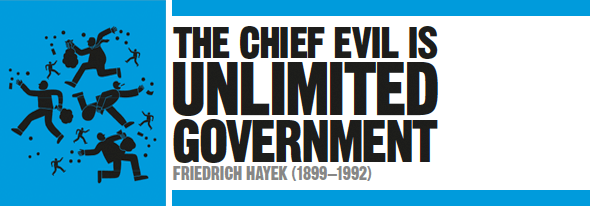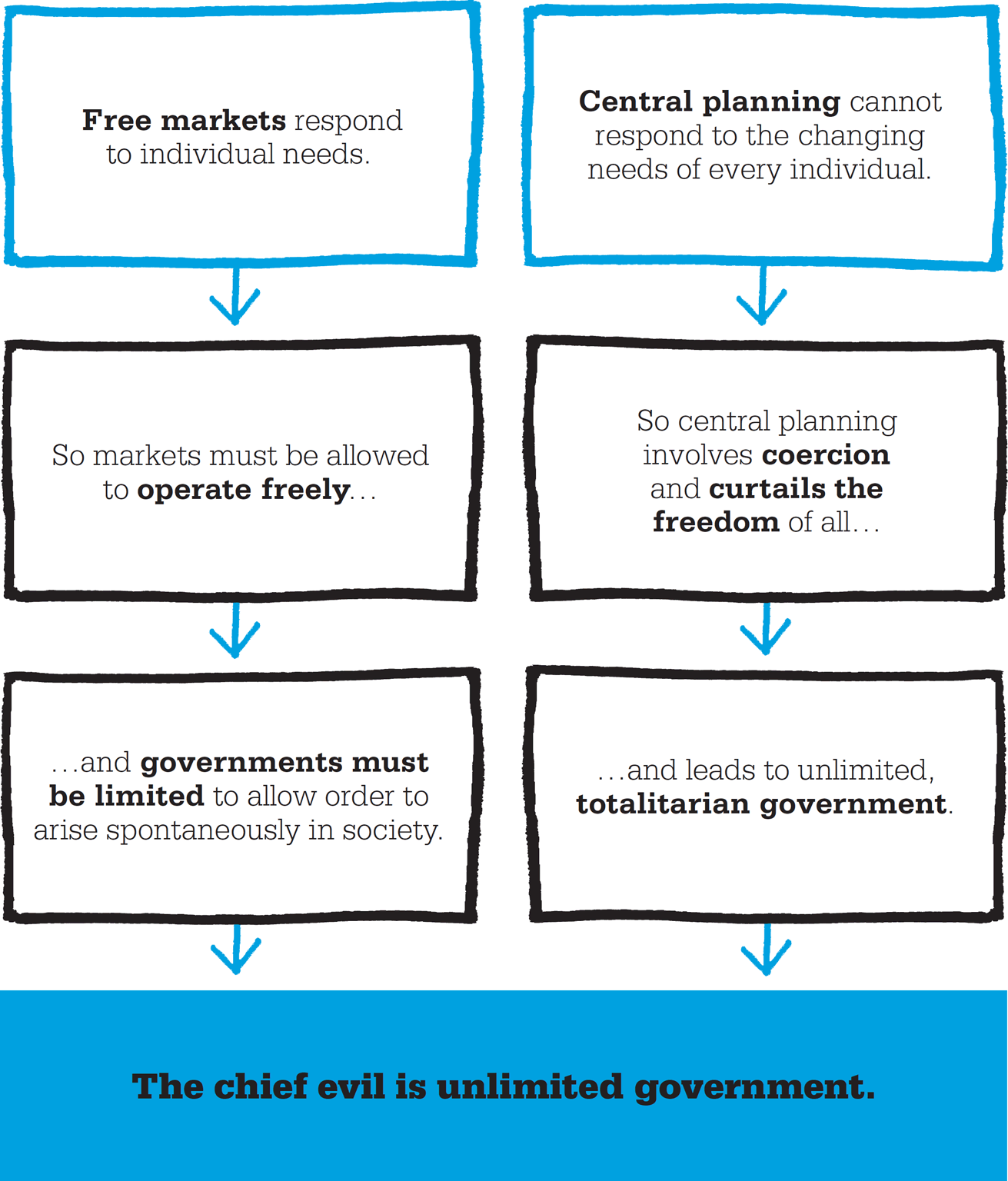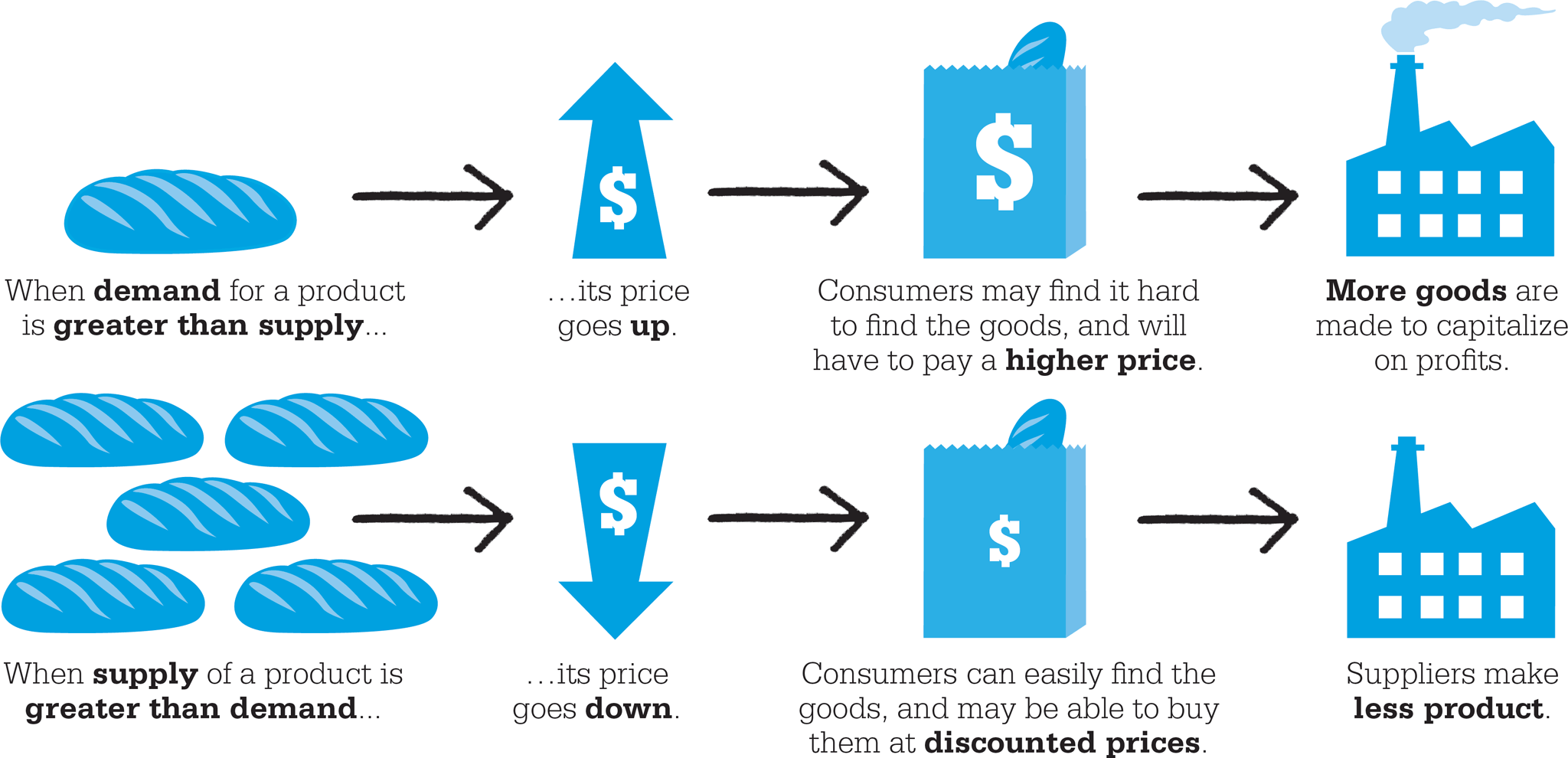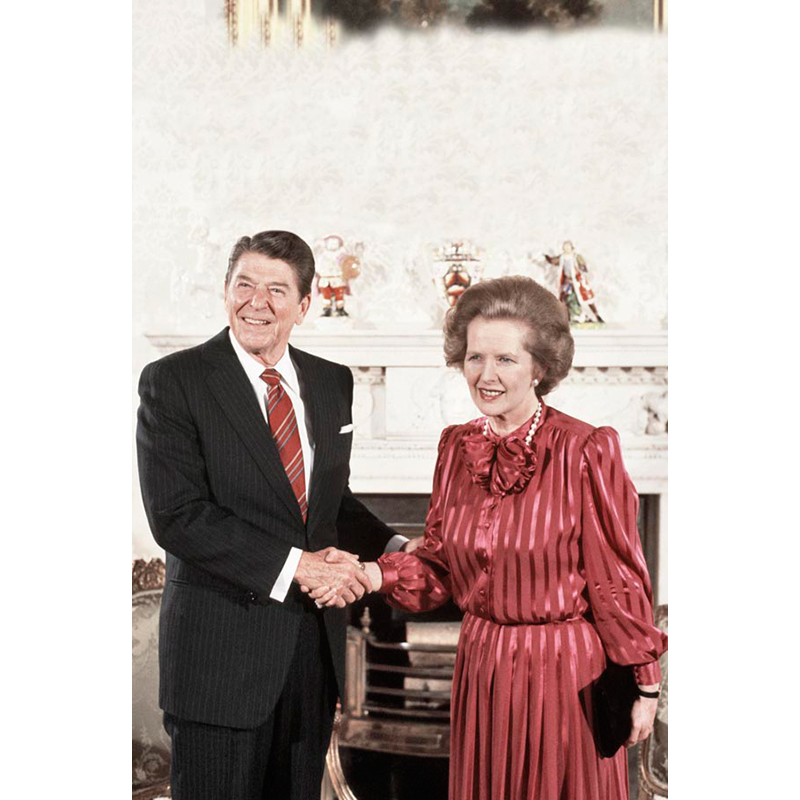
IN CONTEXT
Neoliberalism
Free-market economics
1840 Pierre-Joseph Proudhon advocates a naturally ordered society without authority, arguing that capital is analogous to authority.
1922 Austrian economist Ludwig von Mises criticizes centrally planned economies.
1936 John Maynard Keynes argues that the key to escaping economic depression is government spending.
1962 US economist Milton Friedman argues that competitive capitalism is essential for political freedom.
1975 British politician Margaret Thatcher hails Hayek as her inspiration.
Austrian-British economist Friedrich Hayek wrote his warning against unlimited government in an appendix called “Why I am not a Conservative” in his 1960 work, The Constitution of Liberty. In 1975, newly elected British Conservative party leader Margaret Thatcher threw this book on a table at a meeting with her fellow Conservatives declaring, “This is what we believe.”
Thatcher was not the only conservative politician to admire Hayek’s ideas, and he has emerged as something of a hero to many politicians on the right. For this reason, it may seem strange that he should have so firmly insisted that he was not a conservative. Indeed, such is the apparent ambiguity of his position that many commentators prefer the term “neoliberal” to describe Hayek and others who, like Thatcher and US president Ronald Reagan, championed the idea of unfettered free markets.

Hayek versus Keynes
The principle of free markets is at the heart of Hayek’s insistence that “the chief evil is unlimited government.” Hayek first came to public prominence in the 1930s, when he challenged British economist John Maynard Keynes’s ideas for dealing with the Great Depression. Keynes argued that the only way to get out of the downward spiral of unemployment and sluggish spending was with large-scale government intervention and public works. Hayek insisted that this would simply bring inflation, and that periodic “busts” were an inevitable—indeed necessary—part of the business cycle.
Keynes’s arguments won over policy makers at the time, but Hayek continued to develop his ideas. He argued that central planning is doomed to failure because the planners can never have all the information required to account for the changing needs of every individual. It is simply a delusion to imagine that planners might have the omniscience to cater for so many disparate needs.
"A claim for equality of material position can be met only by a government with totalitarian powers."
Friedrich Hayek
The gap in the planning is data, and this is where free markets come in. Individuals have a knowledge of resources and the need for them that a central planner can never hope to have. Hayek contended that the free market reveals this knowledge perfectly and continually. It does so through the operation of prices, which vary to signal the balance between supply and demand. If prices rise, you know that goods must be in short supply; if they fall, goods must be oversupplied. The market also gives people an incentive to respond to this knowledge, boosting production of goods in short supply to take advantage of the extra profits on offer. Hayek viewed this price mechanism not as a deliberate human invention, but as an example of order in human society that emerges spontaneously, like language.

According to Hayek, a free market spontaneously matches the availability of resources to the need for them through supply and demand. The knowledge to make these adjustments deliberately is way beyond the possibility of any individual.
Loss of freedom
Over time, Hayek began to feel that the gap between the planned economy and the free market was not simply a matter of bad economics but a fundamental issue of political freedom. Planning economies means controlling people’s lives. And so, in 1944, as World War II raged on, he wrote his famous book The Road to Serfdom to warn the people of his adopted country, Britain, away from the dangers of socialism.
"Economic control is not merely control of a sector of human life which can be separated from the rest, it is the control of the means for all our ends."
Friedrich Hayek
In The Road to Serfdom, Hayek argues that government control of our economic lives amounts to totalitarianism, and makes us all serfs. He believed that there was no fundamental difference in outcome between socialist central control of the economy and the fascism of the Nazis, however different the intentions behind the policies. For Hayek, to put any economic master plan into action, even one intended to benefit everyone, so many key policy issues must be delegated to unelected technocrats that such a program will be inherently undemocratic. Moreover, a comprehensive economic plan leaves no room for individual choice in any aspect of life.
Government needs limits
It is in The Constitution of Liberty that Hayek’s arguments about the link between free markets and political freedom are most fully developed. Despite his assertion that free markets must be the prime mechanism to give order to society, he is by no means against government. Government’s central role, Hayek asserts, should be to maintain the “rule of law,” with as little intervention in people’s lives as possible. It is a “civil association” that simply provides a framework within which individuals can follow their own projects.
The foundations of law are common rules of conduct that predate government and arise spontaneously. “A judge,” he writes, “is in this sense an institution of a spontaneous order.” This is where Hayek’s claim that he is not a conservative comes in. He argues that conservatives are frightened of democracy, and blame the evils of the times on its rise, because they are wary of change. But Hayek has no problem with democracy or change—the problem is a government that is not properly kept under control and limited. He asserts that “nobody is qualified to wield unlimited power”—and that, he implies, includes “the people.” Yet, “the powers which modern democracy possesses,” he concedes, “would be even more intolerable in the hands of some small elite.”
"A government big enough to give you everything you want is strong enough to take everything you have."
Gerald Ford
Hayek is critical of laws intended to remedy a particular fault and believes that government use of coercion in society should be kept to a minimum. He is even more critical of the notion of “social justice.” The market, he says, is a game in which “there is no point in calling the outcome just or unjust.” He concludes from this that “social justice is an empty phrase with no determinable content.” For Hayek, any attempt to redistribute wealth—for instance, by raising taxes to pay for the provision of social welfare—is a threat to freedom. All that is needed is a basic safety net to provide “protection against acts of desperation by the needy.”
For a long time, Hayek’s ideas had only a few disciples, and Keynesian economics dominated the policies of Western governments in the postwar years. Many countries established welfare states despite Hayek’s warnings against it. But the oil shortage and economic downturn of the 1970s persuaded some to look again at Hayek’s ideas, and in 1974, to the surprise of many, he was awarded the Nobel Prize for Economics.
From this point on, Hayek’s ideas became the rallying point for those who championed unregulated free markets as the route to economic prosperity and individual liberty. In the 1980s, Reagan and Thatcher pursued policies intended to roll back the welfare state, reducing taxation and cutting regulations. Many of the leaders of the revolutions against communist rule in eastern Europe were also inspired by Hayek’s thinking.

In postwar Europe, the ideas of John Maynard Keynes won out over those of Hayek. Key industries such as the railways were run by state-owned companies.
Shock policies
Hayek’s claim to be a liberal has been criticized by many, including former British Liberal Party leader David Steel, who argued that liberty is possible only with “social justice and an equitable distribution of wealth and power, which in turn require a degree of active government intervention.” More damning still from a liberal point of view is the association of Hayek’s ideas with what Canadian journalist Naomi Klein describes as the “shock doctrine.” In this, people are persuaded to accept, “for their own ultimate good,” a range of extreme free-market measures—such as rapid deregulation, the selling of state industries, and high unemployment—by being put in a state of shock, either through economic hardship or brutal government policies.
Hayek’s free-market ideology became associated with a number of brutal military dictatorships in South America, such as that of General Augusto Pinochet in Chile—apparently just the kind of totalitarian regime Hayek was arguing against. Hayek was himself personally associated with these regimes, though he always insisted that he was only giving economic advice.
Hayek remains a highly controversial figure, championed by free marketeers and many politicians on the right as a defender of liberty, and despised by many on the left, who feel his ideas lie behind a shift toward hardline capitalism around the world that has brought misery to many and dramatically increased the gap between rich and poor.

Ronald Reagan and Margaret Thatcher both enthusiastically embraced Hayek’s message that government should be shrunk, cutting taxes and state-provided services.
FRIEDRICH HAYEK

Born in Vienna in 1899, Friedrich August von Hayek entered the University of Vienna just after World War I, when it was one of the three best places in the world to study economics. Though enrolled as a law student, he was fascinated by economics and psychology, and the poverty of postwar Vienna urged him to a socialist solution. Then in 1922, after reading Ludwig von Mises’s Socialism, a devastating critique of central planning, Hayek enrolled in Mises’s economics class. In 1931, he moved to the London School of Economics to lecture on Mises’s theory of business cycles, and began his sparring with Keynes on the causes of the Depression. In 1947, with Mises, he founded the Mont Pèlerin Society of libertarians. Three years later, he joined the Chicago school of free-market economists, along with Milton Friedman. By his death in 1992, Hayek’s ideas had become highly influential.
Key works
1944 The Road to Serfdom
1960 The Constitution of Liberty
See also: Immanuel Kant • John Stuart Mill • Pierre-Joseph Proudhon • Ayn Rand • Mikhail Gorbachev • Robert Nozick
